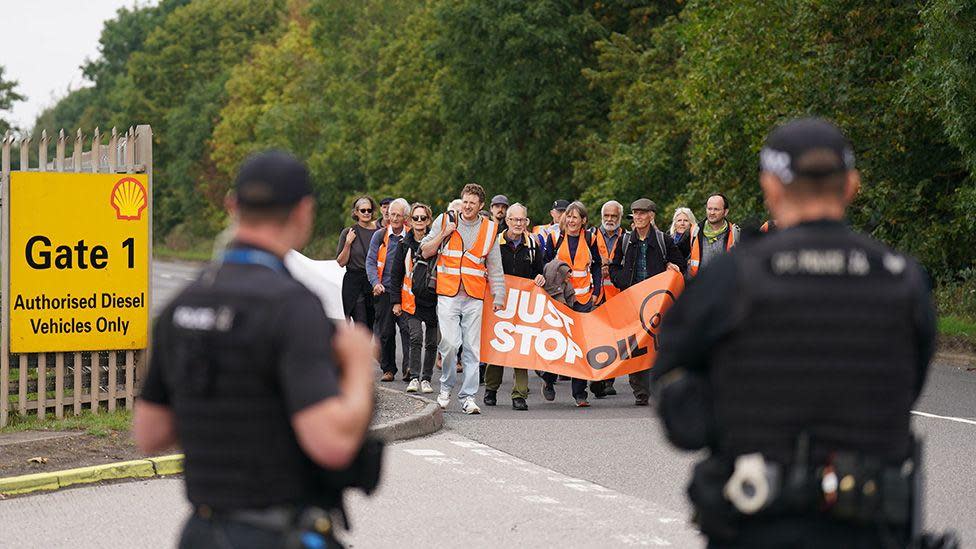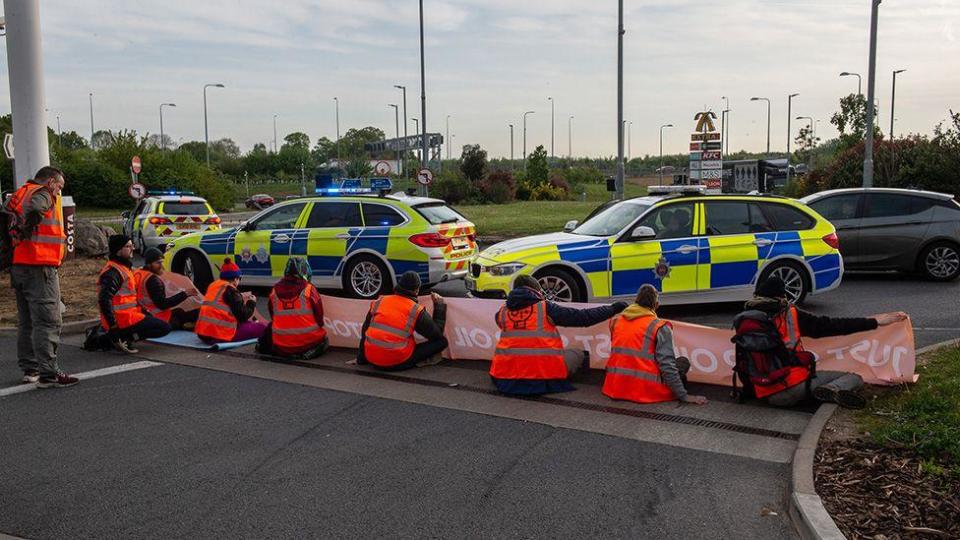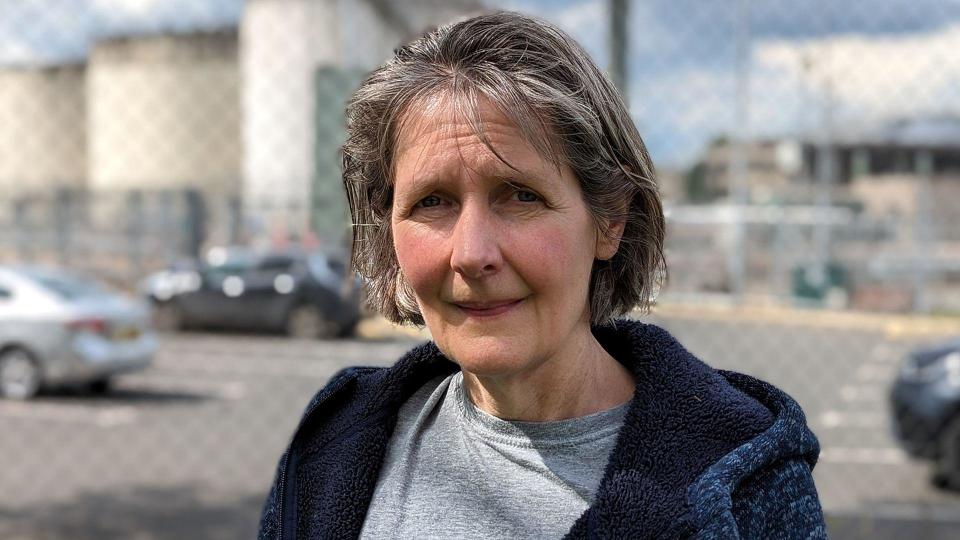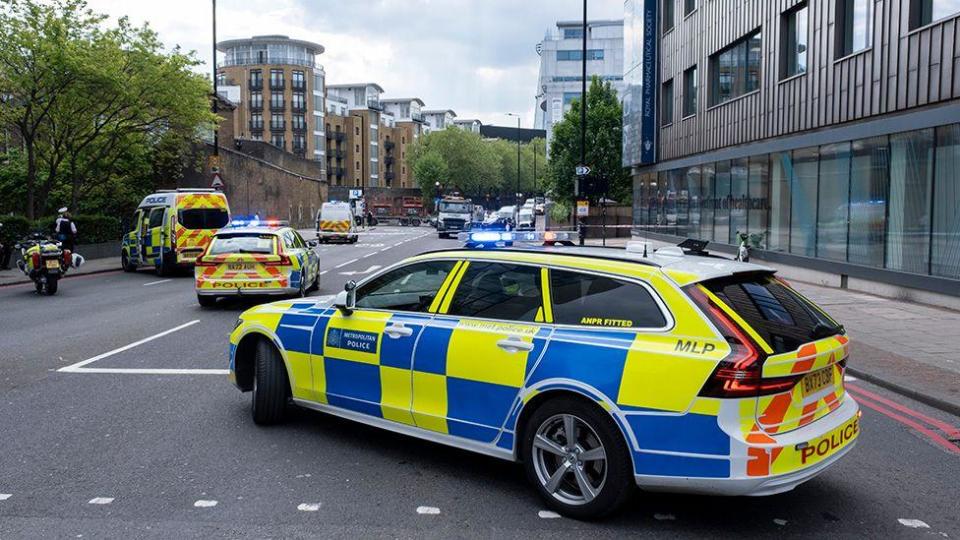'Slow-walk' protests banned at 1,200 locations

The scale of efforts by oil companies and public bodies to protect their premises from environmental protesters can be revealed in new BBC analysis.
More than 400 demonstrators are named in court orders that restrict protests at more than 1,200 locations, the data gathered by File on 4 shows.
The civil injunctions - in force at places like oil terminals, petrol stations and racetracks across England and Wales - also apply to “persons unknown”, meaning anyone could be prosecuted.
The enforcement of civil injunctions has been reported before, but our analysis is the first time the extent of their use has been calculated.
Oil companies and public bodies say the orders are needed to prevent disruptive and dangerous protests. But a lawyer acting for protesters says they are unfair and amount to a “privatised system of justice”.
Raj Chada, the head of criminal law at Hodge Jones and Allen, has told us his firm had no injunction cases until 2021, but it is now representing close to 80 individuals.
“There was the odd case previously, but the scope and number of [protest] injunctions is now unprecedented,” he says.

Listen on BBC Sounds now, or on Radio 4 at 20:00 on Tuesday 2 July and 11:00 on Wednesday 3 July

The anti-protest injunctions limit what people can do, who they can associate with and where they can go.
The punishment for breaching one can be up to two years imprisonment or an unlimited fine - a heavier penalty than for equivalent offences in criminal law.
Eight have been taken out by oil companies including Shell, Esso and ExxonMobil.
National Highways and Transport for London account for five more - and the other two were taken out by local councils (one by North Warwickshire and a joint injunction by Essex and Thurrock).

These organisations argue the measures are needed to deter protesters, because police can only act after an offence has been committed.
However, lawyers acting for the protesters argue that civil injunction proceedings lack some of the safeguards of the criminal system.
A civil injunction application can be made without the knowledge of the defendant or any representation in court. Once an order is granted, attempts should be made to inform those named - including putting up signs, sending emails to protest groups and serving papers on individuals in their homes.
Few applications to the High Court are challenged because legal aid is not available for the initial hearing, says lawyer Raj Chada. Protesters can argue their case at a second hearing, but must abide by the injunction's rules until then.
Breaching an injunction is not technically a criminal offence - however, local authorities can apply for special powers to give police the power of arrest.
Sarah Benn, a retired GP from Birmingham, was imprisoned for 32 days in 2022 for repeatedly breaching an injunction preventing protests near Kingsbury Oil Terminal in Warwickshire, the largest inland oil storage depot in the UK.
Her breach consisted of protesting on a grass verge and sitting on the private road leading into the terminal.
“They could easily have… arrested us for obstruction of the highway,” she says, “but because [we had] breached the High Court injunction we all went to prison.”
Benn was one of 10 people given custodial sentences for breaching the injunction three or more times. Fifty-one people spent time in prison on remand after being arrested for breaking the injunction.

North Warwickshire Borough Council - which took out the injunction - has declined to comment as it is applying to the High Court to renew the measure for three more years.
However, court documents filed by the council’s lawyers claim the actions of the protesters, which included entering the site and climbing oil storage tanks, could have led to an explosion affecting the entire area.
Oil companies on the Kingsbury site have declined to comment. Valero Energy, which operates out of the terminal, has a separate anti-protest injunction in place.
A Freedom of Information request submitted by the BBC shows North Warwickshire council officers met oil company representatives 10 times, partly in relation to obtaining the injunction. The council does not hold minutes of the meetings. The request also reveals the council spent £155,000 on legal fees in the process.
Lawyer Raj Chada argues the proliferation of injunctions amounts to “private justice” - only available to those who can afford to pay.
Protesters risk being ordered to pay their opponents’ legal bills if they make an unsuccessful challenge to the injunction, he says. “[This} can run to hundreds of thousands of pounds.”
The environmental group, Friends of the Earth, is now taking a case to the European Court of Human Rights, challenging the use of anti-protest injunctions in the UK.

File on 4 has contacted the other organisations to have successfully applied for civil injunctions.
National Highways says it is unable to comment due to the general election, but it has previously said it sought injunctions to deter extremely dangerous and reckless protests on motorways.
Transport for London says it took out injunctions to ensure London’s road network could operate safely and that emergency service vehicles could move freely through the city.
Essex County Council and Thurrock Council say their injunction does not restrict anyone’s right to carry out lawful protest. “It simply seeks to stop protestors from unlawfully blocking or damaging the public highway as part of that protest,” says a spokesperson.
Shell says the injunctions are not about preventing freedom of expression but preventing “unlawful and dangerous protests”.
Esso and ExxonMobil told us they were unable to comment on active litigation matters.


